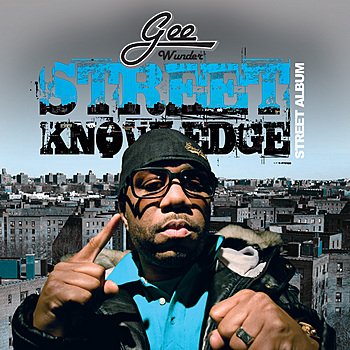There is a clear and vicious dichotomy in the rap game between those that rap about their own swagger and evoke imagery with negative connotations and the others who rap about peace, knowledge and understanding. It’s not my position to say if there is proper subject matter to expound on, because it depends on the artists’ perception of life and music. Gee Wunder plays on this dichotomy with this street album, a precursor to his official debut “For the People” coming soon, which offers two perceptions; a street side and a knowledge side. The concept is solid enough. Despite labeling the distinction, Wunder’s new disc is really, as the title “Street Knowledge” suggests, a culmination of both, because the narrative that unfolds is never really optimistic in its nature.
The Toronto-raised emcee tackles various topics on “Street Knowledge.” Most of the issues raised on the street side of the disc are social, whereas the knowledge side focuses on the grind of street hustling; however, there are certainly tracks that could fall on either end of spectrum and this split becomes less clear near the latter part of the first part, especially with songs like “Stop Snitchin’ On Urself” and “Get Ur Weight Up.”
The social aspects of street life that are brought to light often seem rather inconsequential. Songs like “Hat Wit Da Tag On” do not really speak to any unique perspective that Wunder has as a Canadian rapper. The track indicates that he sees his Live Motivators crew as trendsetters by rockin’ hats with the tags on, as well as t-shirts and jeans, the chorus suggests. Furthermore, Wunder notes “That’s how we do it in the hood,” but one will be left in bewilderment as to why there is a song about this in the first place. The following track “Check Out My Swag” is an extension of the same dire idea.
Meanwhile, equally shallow cuts may grab some interest. Strangely, there is some kind of innate and immediate attraction to tracks like “The Knock.” This joint is simply about the power of a banging beat–a knocking beat. The Contraverse-production is rather simple; repetitive, synthetic keys and low bass line, but it works, for a minute or two before it becomes mundane, thanks in part to a plodding verse. But, there is an obvious difference between the tracks that Gee Wunder creates himself and those that he enlists others for, as Gee seems to have a groovier boom bap type of influence.
The best song on the album is a storytelling affair that tells the tale of assumedly fictional characters getting dragged down by the system that uses some of that bouncy groove. The names of the characters, Pam and Richie, only seem to be created to connect a name with a greater theme. With “Catchin’ Cases” Wunder finally brings a little bit of knowledge after all, or at least social consciousness with a chorus that points out inequalities:
“My people be catchin’ cases, catchin’ cases
Catchin’ out in a world that’s epidemically racist
Do the crime, do the time, stay far from the hole
Live motivators make moves on the low”
Gee seems concerned with the collateral effect of some of these stereotypical lives when he raps, “The youth are affected.”
“Contraband” is another successful endeavor, because it delves into the thought of some who feel trapped by societal constraints. Gee Wunder promotes drug hustling when he states “Our only means of survival, contraband.” He implies that slanging puts socks on toes. Meanwhile, he creates another character, Sally, who ruins her life along with her family’s because of addiction. Ultimately, the track tells both sides of the story.
There are certain mixtape elements of “Street Knowledge” that get annoying throughout the listening experience. As a street album, the songs kind of flow into one another, but at the beginning of most songs there is the trademark club siren noise. Secondly, there is a rewinding scratch that draws focus onto some of the earlier lines on some of the songs. These are all fairly standard mixtape elements, so that cannot be held too much against the featured artist.
Gee Wunder is an assimilation of the street and knowledge. He is not the pure crunk rapper of Lil’ John or the mindful lyricist of Talib Kweli, yet a fair balance of the two. “Street Knowledge” is a street album that shows some promise for Gee Wunder, but there is not enough to separate him from the rest of the crowded scene.

